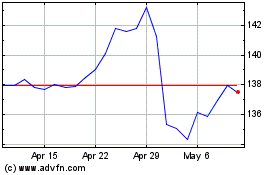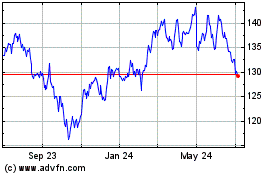Yum Looks to Be Leaner After China Spinoff
October 11 2016 - 8:00AM
Dow Jones News
By Julie Jargon
Yum Brands Inc. plans to become a leaner company that operates
fewer of its own restaurants after it spins off its volatile China
business next month.
The parent of KFC, Pizza Hut and Taco Bell said on Tuesday that
it plans to increase the percentage of restaurants owned by
franchisees to at least 98% by the end of fiscal 2018, up from 77%
currently. The China spinoff alone will boost that figure to 93%
because the China business, which accounts for more than half of
Yum's revenue, will license the brands, paying Yum an annual
royalty fee.
Many restaurant brands have been moving to an "asset light"
structure in which they own the brands but not the actual
restaurants. The model allows restaurant companies to shoulder less
risk and volatility because they can collect a stable revenue
stream in the form of a percentage of franchisees' sales.
McDonald's Corp., Restaurant Brands International Inc.'s Burger
King, Wendy's Co. and other major chains have been selling more of
their company-owned restaurants to franchisees.
"As a 'pure play' franchisor, the transformed Yum Brands will
become more efficient and capital-light with an optimized capital
structure, improved cash flow and laser-like focus on our key
strategies to drive same-store sales and new unit growth
world-wide," Chief Executive Greg Creed said in a statement.
The company also announced plans to reduce its annual capital
expenditures to approximately $100 million by the end of fiscal
2019 from $500 million, and to reduce its general and
administrative expenses by approximately $300 million by the end of
fiscal 2019.
Yum last month struck a deal to sell part of its China
operations to a prominent Chinese deal maker and the financial
affiliate of Chinese internet giant Alibaba Group Holding Ltd.
Primavera Capital, run by former Goldman Sachs Group Inc. Greater
China Chairman Fred Hu, and Ant Financial Services Group will buy a
combined $460 million stake in the Yum China Holdings Inc. spinoff.
The China business will begin trading separately on the New York
Stock Exchange on Nov 1.
Louisville, Ky.-based Yum built KFC into China's most popular
fast-food chain since it entered the country in 1987. The company
in recent years has faced increasing competition from foreign and
local fast-food rivals in China as well as numerous food-safety
scares, which resulted in volatile sales. With the China business
separated, Yum can now concentrate on improving the sales of its
brands in the U.S. and other markets.
In its third quarter, systemwide sales at KFC rose 7%. Taco Bell
reported a 5% increase and system sales at Pizza Hut were flat. Yum
executives at an investor conference on Tuesday plan to outline
their plans for boosting sales at all of their brands following the
China spinoff.
Write to Julie Jargon at julie.jargon@wsj.com
(END) Dow Jones Newswires
October 11, 2016 07:45 ET (11:45 GMT)
Copyright (c) 2016 Dow Jones & Company, Inc.
Yum Brands (NYSE:YUM)
Historical Stock Chart
From Mar 2024 to Apr 2024

Yum Brands (NYSE:YUM)
Historical Stock Chart
From Apr 2023 to Apr 2024
